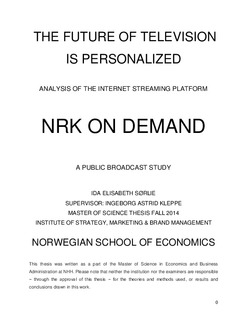The Future of television is personalized : analysis of the internet streaming platform NRK on demand : a public broadcast study
Master thesis
Permanent lenke
http://hdl.handle.net/11250/2485290Utgivelsesdato
2014Metadata
Vis full innførselSamlinger
- Master Thesis [4372]
Sammendrag
Portraying a public broadcasters’ digital challenge, the thesis presents an analysis of the new
reality, which is disrupting the world of media, entertainment and news. Targeting the dilemmas
of the Norwegian Broadcasting Corporation, NRK, it seeks to offer alternatives for maximizing
their public service mandate through their On Demand platform. Discussing its strengths and
weaknesses, this thesis presents a proposal for the next strategic step of public service broadcasters:
transforming their business model and offering personalized experiences while retaining their
identity as public service broadcasters. Considering the competitive climate and technological
media development, personalized accounts are the next frontier online. Digital accessibility and
content strategies are essential to compete in a global market. The target is innovators and early
adopters in Norway, represented by millennials (born 1981-1996). Today, the group´s low
engagement rate with the brand and its content is the premier issue plaguing the organisation. The
thesis answers how public broadcasters, as former dominant market players, can develop in a new
dynamic environment and compete in the video streaming services. For public broadcasters
engaging with Millennials is key to re-establish positive relationships - it links with their future
survival. Scoring high on perceived quality and trust, focus on creating and capturing value
through consumer experiences appears the best way to maximize value. Reviewing both resource
based view and an external analysis, the emergent media patterns of consumer behaviour is best
traced through the experiential view. NRK primary strength is their extensive content library, and
their weakness is that they are not leveraging this resource. Learning from digital winners
elsewhere, NRK must curate content to add context and improve semantic networks with tags.
Content ought be classified in intuitive, fresher categories that are relevant to the consumer. By
asking for individual preferences, NRK will be able to offer tailored experiences digital natives
are used to having online. Content sharing, state of “flow” and other elements of gamification are
also key drivers of consumption. In the age of digital abundance and fragmentation, consumers
search costs must be alleviated – either by Meta-data or by play. In this sector, personalization and
advertising avoidance are becoming bigger differentiators than price. Introducing strategies to
energize the platform, NRK should also spend trust capital to leverage the brand and certain type
of content. The thesis is a testimony to the personalization of media content and the expansion,
and future of Television.
